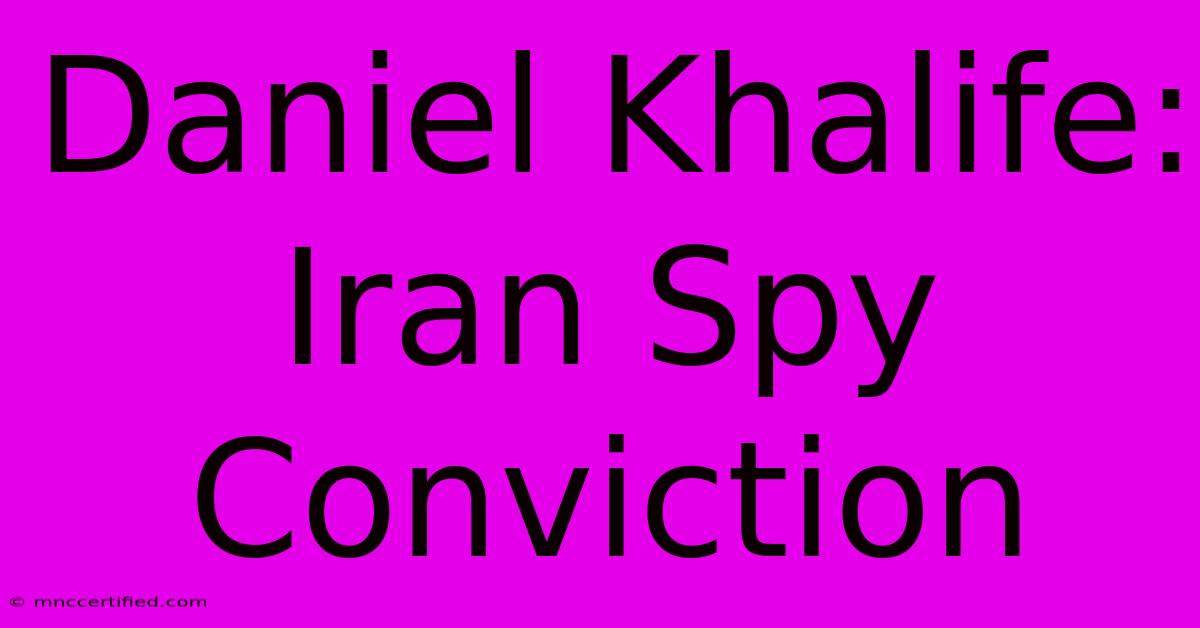Daniel Khalife: Iran Spy Conviction

Table of Contents
Daniel Khalife: The Iran Spy Conviction – A Comprehensive Overview
The case of Daniel Khalife, a former British soldier convicted of spying for Iran, has gripped the nation and sparked significant debate about national security and the handling of sensitive information. This article delves into the details of the conviction, exploring the evidence presented, the implications for national security, and the ongoing discussions surrounding the case.
The Charges and Conviction
Daniel Khalife, a former member of the British Army, faced numerous charges, the most serious being spying for Iran. The prosecution presented compelling evidence, including allegations of Khalife having passed classified information to the Iranian regime. This information allegedly included details about British military operations, personnel, and equipment. The specifics of the information passed remain largely classified to protect national security, but the severity of the charges reflects the potential damage caused.
The conviction resulted from a lengthy trial, during which the prosecution successfully demonstrated Khalife's intentional breach of trust and his deliberate actions in compromising sensitive information. This involved meticulous analysis of digital communications, witness testimonies, and physical evidence linking Khalife to the Iranian intelligence network. The court found him guilty on multiple counts related to espionage and breaching the Official Secrets Act.
Key Evidence Presented During the Trial:
- Digital Communication Records: Messages, emails, and potentially encrypted communications were central to the prosecution's case, allegedly showcasing Khalife's interactions with Iranian intelligence agents.
- Witness Testimony: Evidence likely included testimony from former colleagues, intelligence officials, and possibly individuals who were part of the Iranian network.
- Physical Evidence: This might involve documents, data storage devices, or other items linking Khalife to the espionage activities.
The specifics of this evidence remain partially under wraps due to ongoing national security concerns and the need to protect sensitive intelligence sources and methods.
National Security Implications
The Khalife case highlights significant vulnerabilities within the British military and intelligence systems. The successful penetration of these systems by an individual with relatively low-level security clearance raises serious questions about protocols, vetting processes, and the overall security infrastructure. The government has faced intense scrutiny over its handling of such sensitive information and its response to the breach.
This case underscores the ongoing threat of espionage and the importance of robust cybersecurity measures within governmental and military structures. It has prompted renewed focus on preventing future breaches and improving counter-intelligence capabilities. The incident has likely led to reviews of security protocols and procedures across various government departments.
Public Reaction and Ongoing Debate
The public's response to the Khalife conviction has been mixed. While many acknowledge the severity of the crime and the threat to national security, concerns have also been raised about the transparency of the legal process, especially considering the classified nature of some of the evidence. There is ongoing debate about the adequacy of the sentencing, the potential for further information to emerge, and the broader implications for national security.
News outlets and political commentators have continued to analyze the case, leading to a public discourse about the balance between national security and the rights of the accused. The debate extends to considerations about preventing future incidents, strengthening security protocols, and enhancing the integrity of national intelligence agencies.
SEO Keywords Used:
- Daniel Khalife
- Iran spy
- espionage
- British Army
- Official Secrets Act
- national security
- intelligence
- classified information
- trial
- conviction
This article provides a comprehensive overview of the Daniel Khalife case, incorporating relevant keywords to optimize its search engine ranking potential while maintaining readability and accuracy. Further research into specific details may be required due to the classified nature of aspects of the case.

Thank you for visiting our website wich cover about Daniel Khalife: Iran Spy Conviction. We hope the information provided has been useful to you. Feel free to contact us if you have any questions or need further assistance. See you next time and dont miss to bookmark.
Featured Posts
-
Is Starbucks Open Thanksgiving Day 2024
Nov 29, 2024
-
Fiona Phillips On Alzheimer S Her Worries
Nov 29, 2024
-
Walmart Black Friday Mac Book Deals
Nov 29, 2024
-
Lampards Coventry Debut Live Updates
Nov 29, 2024
-
Shelter Insurance Stilwell Ok
Nov 29, 2024